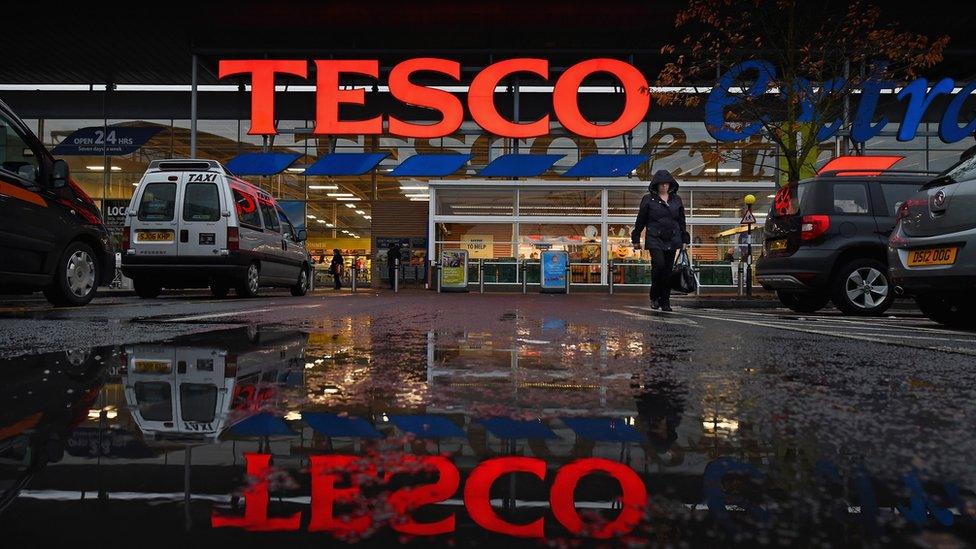The Tesco trap - anyone can sell baked beans at a loss
- Published
- comments

Last Christmas, more than half of Britain's shoppers tried the discount experience of Aldi or Lidl.
For a supermarket like Tesco, that figure is chilling for two reasons.
Firstly, Christmas was traditionally the time when promiscuous shoppers returned to the Big Four to fill their groaning family trolleys. That is no longer the case - Lidl sells champers too.
And, secondly, if half of shoppers tried Aldi and Lidl, that meant that half didn't. Which shows the enormous room for expansion the discounters have.
Both are planning substantial store openings over the next two years, giving the lie to anyone who thinks that the discounter cycle is coming to an end anytime soon.
Aldi has also said it will start an online offer next year, which is likely to send a few more cold winds through Tesco's aisles.
One remarkable fact from Tesco's results today is that it is seen as good news that the UK business (which accounts for three-quarters of the supermarket's revenues) has actually turned a small profit.
For a large part of last year, Dave Lewis, the chief executive, was running the British business at a loss as he desperately tried to encourage customers back through the door.
Frankly, even I could have a good go at selling courgettes at less than I bought them for.
Investors will be heaving a sigh of relief that such an unsustainable position was at least only temporary.
Falling margins
But it's not as if with one bound Mr Lewis is free. For the first half of this year, profits in the UK were down 70% on the same period last year, and the vital operating profit margin is languishing below 1%.
That's for a business that used to enjoy a margin of more than 5%.
Mr Lewis is caught in something of a trap. He must offer customers lower prices if he is to arrest declining sales.
But he also has to provide investors with profits, or the Tesco share price - which has halved in the last two years - is only going to go in one direction.
I asked Mr Lewis if he was worried that Tesco was operating within such tight margins.
"I'm not sure I see it exactly the same way, Kamal," he told me.
"I understand why you say that because you compare this year with the first half of last year, and that's completely understandable.
"But having come into the business, we obviously had some issues to deal with.
"We dealt with them. It meant that in the second half of last year we made no profit whatsoever in the UK.
"So if I compare to the second half of last year, the first half of this year feels like we've made some progress.
"Our sales are growing compared to where they were either a year ago or indeed in the second half of last year, and we've generated some profit as we rebuild the Tesco business.
"Importantly, at the same time we're improving what it is we're doing for our customers."
Living Wage
Mr Lewis told me that he wanted to cut prices further. For that, Tesco will use cost savings within the business and some of the income from the £4bn sale of Tesco's business in South Korea, which has reduced Tesco's debt costs.
But some expenses will be going up. The government's announcement that a "national living wage" of at least £9 an hour will be paid by businesses by 2020 will have a substantial impact on retailers.
Last week I interviewed Sir Ian Cheshire, the former head of B&Q owner Kingfisher, who called for a review of the increase in two years to ensure that the costs for businesses were not too onerous
Although not agreeing with Sir Ian's call, Mr Lewis did tell me he wanted the hourly rate demands of the living wage analysed.
"We supported the fact that the living wage in April was set at a minimum of £7.20," he said.
"We supported that because we actually paid Tesco colleagues [that] already.
"I think the thing that we would like rather than any review is actually a broader discussion about total reward within the retail sector.
"My colleagues receive a base pay, but they also receive a series of benefits, which they really appreciate.
"When you look at those benefits and you monetise those benefits, it gets you very close to the £9 which is what is aspired for in 2020.
"So, the conversation I'm having with my colleagues is around how it is they want to receive their reward from Tesco.
"But a simple reduction of everything into a base rate is not what they want, and I'd like a more intelligent conversation about total reward rather than just talking about base pay per hour."
Mr Lewis knows he is caught between two sometimes conflicting impulses - lower prices for customers and increased profits for investors.
He believes he can produce both, via a better-run business focused on the UK.
Investors remain to be convinced despite a small rise in the share price. The message? Mr Lewis - more work needed.